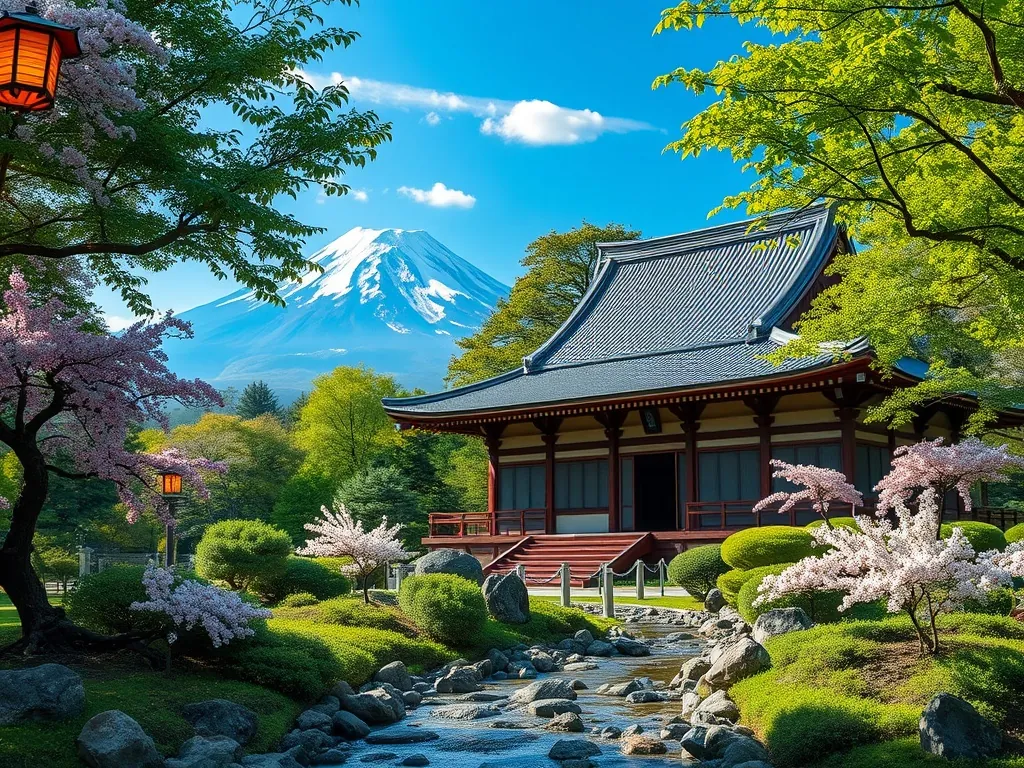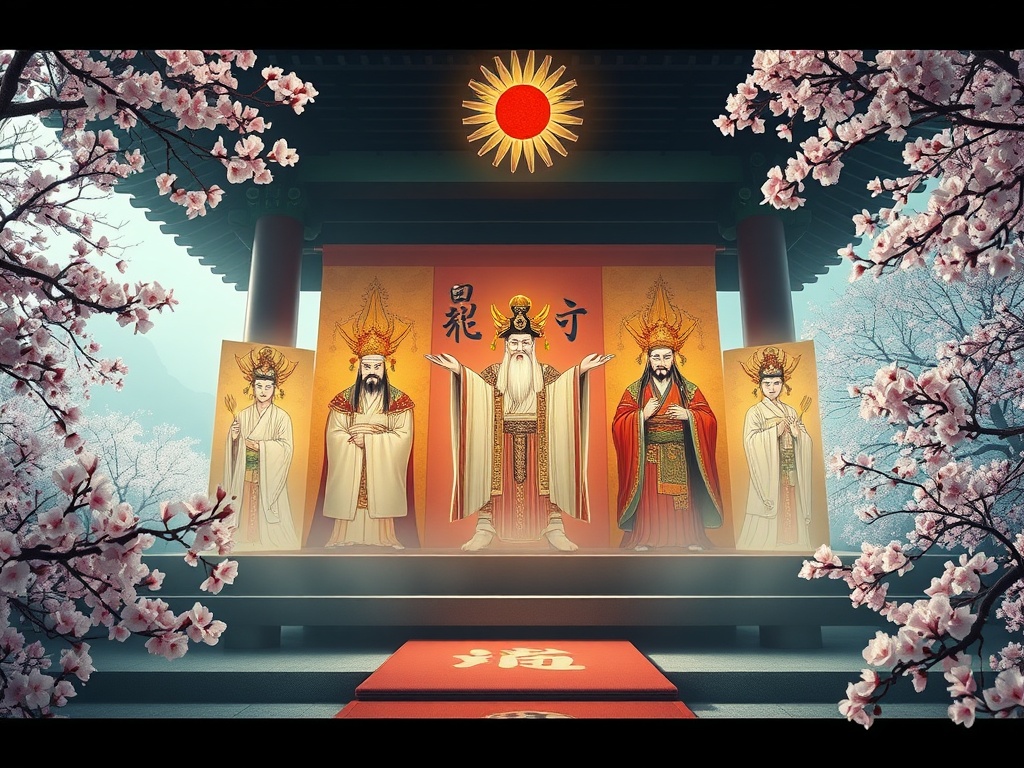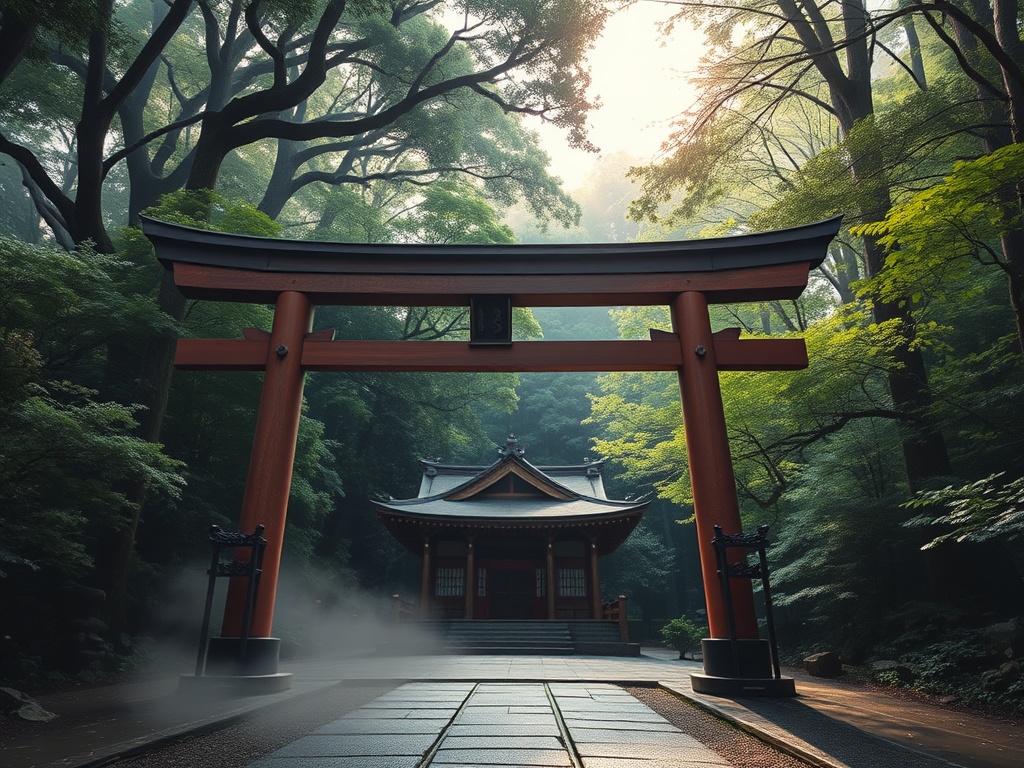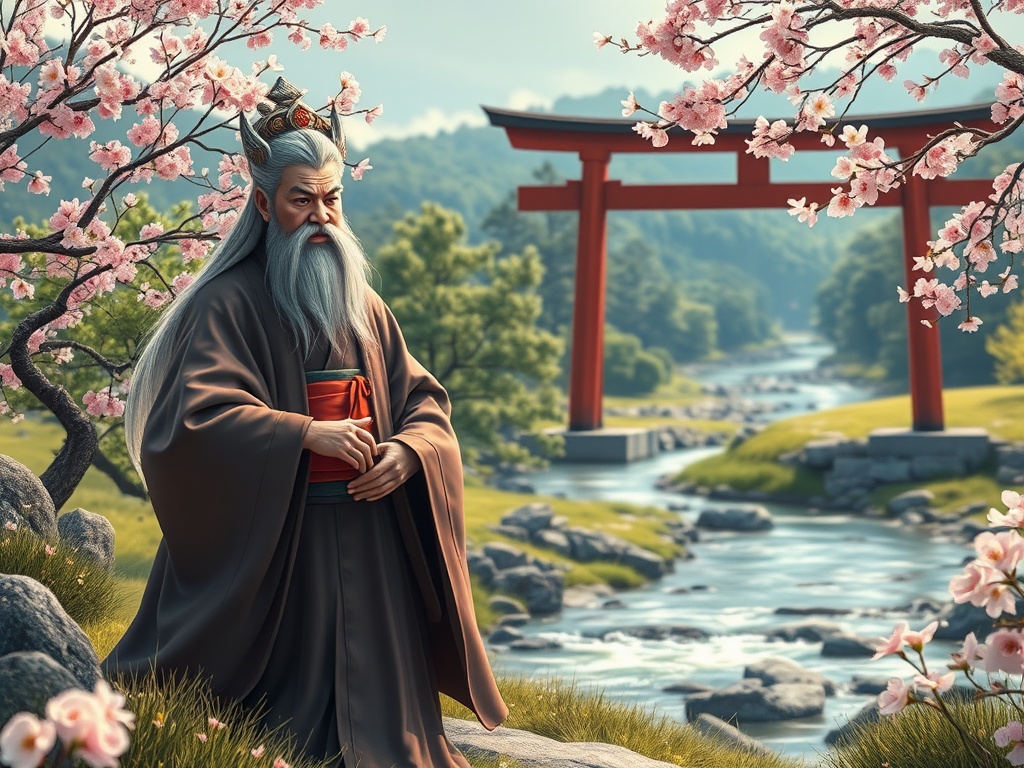Divine Commanders: Unveiling Japan’s Pantheon of Leadership Spirits
Win a Free Trip to Japan!
Experience cherry blossoms and ancient temples
Japan, with its rich tapestry of myths and legends, is home to a fascinating array of deities whose influence spans from the ethereal realms to the mortal world. These divine commanders are revered for their roles in leadership, unity, and strategy, guiding not only the ancient warriors of Japan but also leaving a profound mark on the country’s cultural fabric. Whether you’re a history buff or a spiritual enthusiast, immersing yourself in the stories of these celestial leaders is a journey worth taking. Discover the divine forces that have long inspired Japan’s leaders and warriors to greatness.
In the world of Japanese mythology, leadership is often intertwined with the forces of unity and strategic acumen. These deities not only commanded respect through their might but also through their wisdom and ability to unify clans and kingdoms. Let us delve into the stories of these legendary figures who embody the spirit of leadership in its purest form.
Amaterasu Omikami
The Sun Goddess, Amaterasu, stands as a symbol of hope and renewal. Known for her strategic prowess, she is revered for bringing light to the world, uniting the heavenly and earthly realms. Her story is one of resilience and enlightenment, guiding leaders to be sources of inspiration and wisdom.
Hachiman
Hachiman, the God of War and Divine Protector of Japan, is venerated as a symbol of bravery and strategy. He is often depicted as a patron of warriors, emphasizing the importance of strategic planning and unity in battle. Pilgrims flock to his shrines, seeking blessings for courage and guidance in leadership.
Embarking on a spiritual journey through Japan offers travelers a unique opportunity to connect with these divine commanders. Visiting ancient shrines and sacred sites provides a window into the past, where the influence of these deities is still palpable. Here is a curated list of must-visit sites for those seeking to walk in the footsteps of Japan’s legendary leaders.
- Ise Grand Shrine: Dedicated to Amaterasu, this is one of the most sacred Shinto shrines. Visitors often describe a profound sense of peace and unity here.
- Usa Jingu Shrine: As the head shrine of Hachiman, it stands as a testament to the deity’s enduring influence over Japan’s warrior class.
- Kumano Nachi Taisha: Known for its stunning natural beauty, this shrine is a part of the Kumano Kodo pilgrimage route, offering a spiritual retreat for those seeking guidance.
Sacred Sanctuaries: Where to Find Japan’s Leadership Deities
Embarking on a journey to discover Japan’s leadership deities offers not only a spiritual odyssey but also an exploration of the country’s rich cultural tapestry. These sacred sanctuaries serve as gateways to the mystical world of divine commanders, where history and spirituality intertwine. As you traverse these hallowed grounds, you’ll uncover stories of courage, unity, and strategic wisdom that have shaped the very fabric of Japanese society.
One cannot speak of Japan’s leadership deities without mentioning the Ise Grand Shrine, the venerated home of the Sun Goddess, Amaterasu. This sacred sanctuary is more than just a religious site; it is a symbol of renewal and hope. The air here is imbued with a sense of peace, as if the divine presence of Amaterasu herself watches over the pilgrims. Visitors often recount feeling an overwhelming sense of unity and enlightenment as they walk through the ancient cedar trees and pristine temple grounds. This shrine is a testament to the enduring influence of Amaterasu on Japan’s leadership ideals, offering visitors a profound connection to the past.
Another pivotal site in the exploration of Japan’s divine leadership is the Usa Jingu Shrine, dedicated to Hachiman, the God of War. Known as the divine protector and patron of warriors, Hachiman’s legacy is deeply etched into the ethos of strategic planning and courage. The shrine itself is a beacon for those seeking blessings of bravery and leadership, surrounded by lush greenery that echoes the deity’s protective nature. Pilgrims and tourists alike find themselves drawn to the mystical allure of Usa Jingu, where Hachiman’s spirit is said to guide and inspire those in pursuit of valor and unity.
Mythical Mentors: The Legends Behind Japan’s Leadership Icons
In the mystical lands of Japan, where history and mythology intertwine, the legends of leadership deities have guided the nation’s course for centuries. These mythical mentors are not just relics of the past; they are vibrant tales that continue to inspire leaders and travelers alike. As you embark on a journey to explore these legendary figures, you’ll uncover the profound wisdom and strategic brilliance that have shaped Japan’s cultural and spiritual landscape.
Amaterasu Omikami, the radiant Sun Goddess, is more than a celestial figure; she is a beacon of hope and enlightenment. Her story is woven into the very fabric of Japan’s identity, emphasizing the importance of bringing light to the world. When darkness threatened the heavenly realms, it was her strategic withdrawal and subsequent return that restored balance, teaching leaders the power of resilience and renewal. Pilgrims visiting the Ise Grand Shrine not only seek spiritual solace but also a deeper connection to Amaterasu’s enduring legacy of leadership and unity.
In the realm of strategic warfare and courageous leadership, Hachiman stands as an indomitable force. Revered as the god of war and the divine guardian of Japan, his influence extends beyond the battlefield. Hachiman’s legends are a testament to the virtues of bravery and strategic foresight. At the Usa Jingu Shrine, visitors are drawn to the lush surroundings that echo his protective nature. The stories of Hachiman inspire modern-day leaders to embrace courage and unity, qualities essential for navigating the complexities of leadership in any era.
Rituals of Authority: Ancient Ceremonies Honoring Japan’s Divine Leaders
Travelers venturing into the heart of Japan’s spiritual heritage will find themselves captivated by the ancient rituals that honor the country’s divine leaders. These ceremonies are not just relics of the past; they are vibrant reenactments that breathe life into legends, allowing participants and observers alike to witness the timeless traditions that have shaped Japan’s leadership ethos.
In the sacred grounds of the Ise Grand Shrine, the Kagura dance is performed to honor Amaterasu, the Sun Goddess. This mesmerizing dance, with its elegant movements and spiritual chants, symbolizes the goddess’s triumphant return to the world, bringing light and hope. Participants are often enveloped in a sense of tranquility and enlightenment, as the rhythmic sounds echo through the ancient trees, a reminder of the divine presence that guides Japan’s leaders.
At the Usa Jingu Shrine, the Yabusame ceremony captures the essence of Hachiman, the God of War. This thrilling ritual involves archers on horseback demonstrating their skills, a testament to the strategic prowess and bravery revered by the deity. Spectators are drawn to this dynamic display, which not only honors Hachiman’s legacy but also inspires modern-day leaders to embody courage and unity in their endeavors.
- Kagura Dance at Ise Grand Shrine: A spiritual performance honoring Amaterasu’s light and wisdom.
- Yabusame at Usa Jingu Shrine: A dynamic horseback archery ceremony celebrating Hachiman’s valor.
- Shinto Offerings: Participate in traditional offerings to feel a deeper connection with Japan’s divine leaders.
Wisdom of the Kami: Lessons from Japan’s Leadership Deities
For those who wander in search of ancient wisdom and spiritual guidance, Japan’s leadership deities offer a treasure trove of insights. These kami, or divine spirits, have long been revered for their profound teachings on leadership, unity, and strategy. As you traverse the sacred sites where these deities are honored, prepare to be enveloped in stories that transcend time, offering lessons that resonate with today’s leaders and travelers.
Amaterasu Omikami, the revered Sun Goddess, is more than a deity; she is a beacon of enlightenment. Her narrative teaches the value of strategic withdrawal and renewal, vital lessons for leaders facing modern challenges. In times of darkness, Amaterasu’s re-emergence into the world represents the triumph of light over adversity. As you visit the Ise Grand Shrine, where her presence is most palpable, reflect on the importance of hope and resilience in leadership. The shrine’s tranquil surroundings invite contemplation, urging visitors to carry forth the goddess’s legacy of wisdom and unity.
In the realm of valor and strategy, Hachiman stands as an indomitable figure. As the divine protector and God of War, his teachings emphasize the balance between courage and strategic foresight. At the Usa Jingu Shrine, where lush landscapes echo his protective nature, visitors are inspired by Hachiman’s enduring legacy. His lessons of unity in battle and strategic planning continue to guide those who seek to lead with bravery and integrity. Embrace the spirit of Hachiman by understanding the importance of cohesion and tactical acumen in achieving success.
Travel Through Time: Exploring Japan’s Leadership Deity Heritage
Embark on a captivating journey through the annals of Japan’s history as you explore the sacred sites dedicated to the country’s revered leadership deities. These spiritual odysseys offer more than just a glimpse into Japan’s mythical past; they allow you to experience firsthand the enduring influence of the divine commanders who have shaped the nation’s cultural and spiritual landscape. From the majestic Ise Grand Shrine to the lush surroundings of Usa Jingu, each location tells a story of bravery, wisdom, and unity that resonates through the ages.
At the heart of Japan’s leadership deity heritage lies the Ise Grand Shrine, a site of profound spiritual significance. As you traverse its serene pathways, enveloped by ancient cedar trees, you’ll feel the palpable presence of Amaterasu Omikami, the Sun Goddess. Her legend is a beacon of hope and enlightenment, emphasizing the power of strategic renewal and unity. The shrine’s tranquil atmosphere invites contemplation, offering visitors a chance to reflect on the timeless lessons of resilience and leadership that Amaterasu embodies.
Another cornerstone of Japan’s leadership deity heritage is the Usa Jingu Shrine, dedicated to Hachiman, the God of War. Nestled amidst verdant landscapes, this sacred sanctuary is a testament to Hachiman’s enduring legacy of courage and strategic foresight. As you explore the shrine, you’ll uncover the stories of valor and unity that have inspired generations of warriors and leaders. The spirit of Hachiman encourages visitors to embrace bravery and integrity, qualities that are as essential in today’s world as they were in ancient times.



